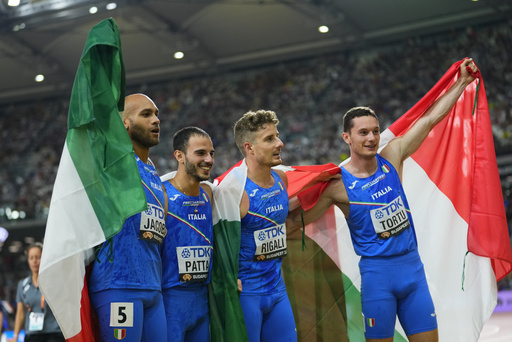In Saint-Denis, France, Filippo Di Mulo has been likened to the Billy Beane character in “Moneyball” for his adept use of math and a detailed database to enhance Italy’s relay team performance. Through his meticulous analysis of baton exchanges stored in a 25-year-old database, Italy has been able to challenge faster teams like the United States and Jamaica consistently. Under Di Mulo’s guidance, Italy secured gold in the 4×100 relay in Tokyo, silver in the previous world championships, and another gold at the recent European Championships. The Italian team is poised as a strong contender in the upcoming Paris Games, with the men’s 4×100 heats scheduled for Thursday followed by the final on Friday.
Di Mulo has developed an algorithm considering factors such as each athlete’s speed, stride length, and foot size to determine the optimal position for relay runners in the 30-meter exchange zone. This algorithm guides the runners on the number of steps required to reach their designated starting point successfully. While adapting the algorithm to each athlete’s characteristics, Di Mulo notes the importance of accounting for human variability, such as starting too early or too late.
Di Mulo’s coaching extends across all of Italy’s relay teams, with the Azzurri qualifying for all five relays in Paris. His meticulous attention to detail and focus on efficient baton passes have earned him praise from athletes like Zaynab Dossu, Italy’s top female 100-meter sprinter. By emphasizing precise handoffs and recognizing individual tendencies, Di Mulo has fostered a strong belief in his coaching methods, with Olympic 100-meter champion Marcell Jacobs dedicating time to relay training camps.
Di Mulo’s strategies have yielded remarkable results, as seen in Italy’s 4×100 relay at the Tokyo Olympics. By calculating an “ability index” based on individual athletes’ best times and relay performance, Di Mulo aims for a collective improvement culminating in gold-winning performances. Despite not being the fastest team globally, Italy’s efficiency in baton exchanges has positioned them as formidable opponents in relay competitions.
While Italy thrives under Di Mulo’s tutelage, the United States faces challenges in relay events, particularly in passing the baton smoothly. Di Mulo points out that the American men have historically struggled in exchanges, impacting their relay performances. Despite offering his coaching expertise to the USA Track & Field in the past, Di Mulo’s invitation was declined as the organization expressed confidence in their existing coaching staff.
Patta, a key member of Italy’s relay team, stands out for his exceptional baton passing skills despite his smaller stature and modest speed compared to other sprinters. With an emphasis on precise handoffs and relentless practice, Italy’s relay team strives for seamless exchanges with minimal time in the exchange zone. The team’s dedication to perfecting their handoffs through meticulous repetition underscores their commitment to excellence in relay competitions.
Di Mulo’s extensive database, spanning back to 2001, plays a crucial role in analyzing performance metrics and guiding training strategies for Italy’s relay teams. Despite the secrecy surrounding the database and algorithm details, the methodical approach adopted by Di Mulo has proven instrumental in Italy’s relay success. As Italy prepares for the Paris Games, the team’s strong relay lineup and strategic approach under Di Mulo’s guidance position them as contenders for relay victories.
